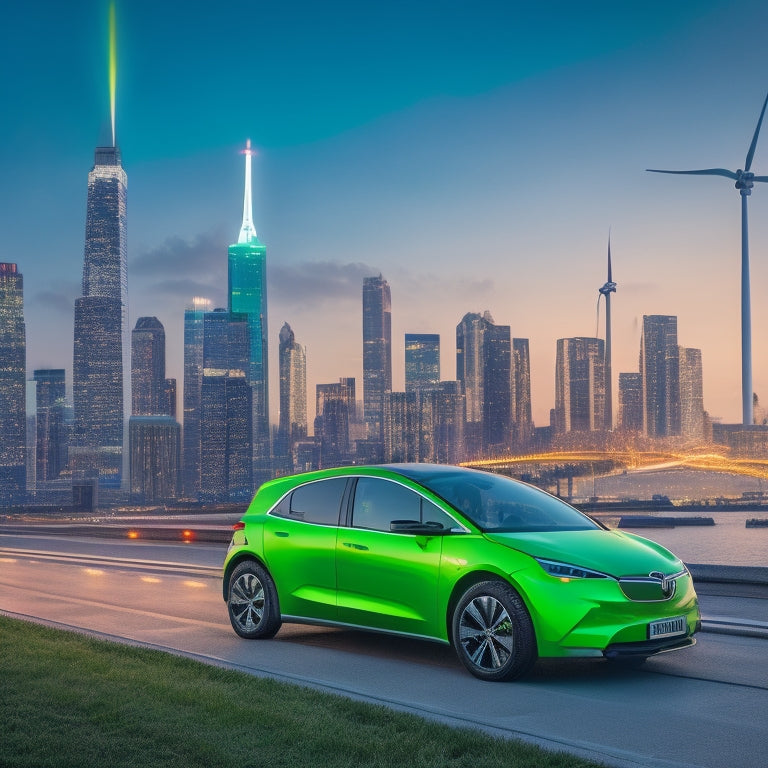
Electric Vehicle Market Trends Spark Interest
Share
The electric vehicle (EV) market is experiencing significant growth, driven by government incentives, technological advancements, and increasing consumer demand for environmentally friendly transportation options. Battery electric vehicles (BEVs) currently hold a 7.3% market share, with a 2.6% year-over-year increase in sales. Notably, consumer preference is shifting towards hybrid or plug-in hybrid vehicles, with environmental concerns a key consideration. As the market continues to evolve, investments in charging infrastructure and battery technologies are expected to further propel growth. Exploring these trends in more depth will uncover further insights into the rapidly changing EV landscape.
Key Takeaways
• Electric vehicle sales are on the rise, with a 2.6% year-over-year increase, driven by consumer preference for environmentally friendly options.
• Government incentives, regulations, and R&D investments are driving market growth, with a substantial increase in market share anticipated.
• Technology advancements are improving battery range and performance, making electric vehicles more appealing to consumers.
• Tesla's market share is declining, while Ford and General Motors are experiencing significant sales growth, gaining traction in the electric vehicle market.
• Charging infrastructure investments and fast-charging technology advancements are crucial for widespread electric vehicle adoption, driving interest in the market.
Electric Vehicle Sales Insights
As the electric vehicle (EV) market continues to evolve, sales insights from the first quarter of 2024 reveal a mixed bag of trends, with battery electric vehicles (BEVs) capturing 7.3% of the market share, a decline from the previous quarter, despite a 2.6% year-over-year increase.
This shift in market share is influenced by consumer preferences, with many opting for hybrid or plug-in hybrid vehicles. The environmental impact of EVs remains a key driving factor, as consumers become increasingly essential eco-conscious.
Tesla's market share remained steady at 52%, while Ford and General Motors saw significant growth, with sales increasing 86% and 16%, respectively.
As the market continues to mature, understanding consumer preferences and environmental concerns will be vital in shaping the future of EV sales.
Market Growth and Trends
Driven by government incentives, regulations, and investments in research and development, the electric vehicle market is poised for substantial growth, with market share expected to increase substantially in the coming years.
As consumer preferences shift towards environmentally friendly options, technology advancements are playing an essential role in driving this growth. Improvements in battery range, charging times, and overall performance are making electric vehicles more appealing to consumers.
Additionally, investments in charging infrastructure and research into new battery technologies are further propelling the market forward. As a result, the market share of electric vehicles is expected to grow significantly, with sales of electrified vehicles already reaching 16.3% of total new light-duty vehicle sales in 2023.
Brand Market Share Analysis
The electric vehicle market's shifting landscape is reflected in the evolving brand market share, with Tesla's dominance slowly eroding as competitors like Ford and Hyundai Motor Group gain ground.
As consumer preferences shift towards sustainable options, brand competition intensifies. Tesla's market share decreased from 62% in 2022 to 52.1% in Q1 2024, while Ford's market share increased to 7.5% and Hyundai-Kia-Genesis held an 8.5% market share. General Motors and Mercedes-Benz also saw significant growth.
This shift is driven by changing consumer preferences, with more buyers prioritizing environmental concerns and seeking affordable electric options. As brand competition heats up, the electric vehicle market is poised for significant growth.
Infrastructure and Regulations
A extensive network of charging stations, supported by advancements in fast-charging technology, is essential for widespread electric vehicle adoption. Charging accessibility is a critical factor in driving adoption rates, with public-private partnerships driving investment in electric vehicle infrastructure.
Governments are setting emission standards, pushing automakers to invest in electric vehicles. Regulations on battery production and disposal are being developed to address environmental impacts. International agreements aim to reduce greenhouse gas emissions from vehicles, with some states phasing out internal combustion engine vehicles.
As the market grows, infrastructure development must keep pace to support the increasing demand for electric vehicles.
Frequently Asked Questions
How Do Electric Vehicles Impact the Environment Compared to Gas-Powered Cars?
Electric vehicles greatly reduce carbon footprint compared to gas-powered cars, meeting stricter emission standards, with a 70% decrease in greenhouse gas emissions and 50% decrease in air pollutants, contributing to a cleaner environment.
Can Electric Vehicles Be Charged Using Renewable Energy Sources Like Solar?
As the sun rises over a sustainable horizon, electric vehicles can indeed be charged using renewable energy sources like solar, leveraging grid parity to optimize energy storage and minimize carbon footprint.
Are Electric Vehicles More Expensive to Maintain Than Traditional Vehicles?
Electric vehicles typically require less maintenance than traditional vehicles, with fewer moving parts and no oil changes needed. Battery longevity is a key factor, as most manufacturers warranty batteries for 8-10 years, and maintenance costs are generally lower due to reduced wear and tear.
Can I Charge My Electric Vehicle at a Friend's House Without Their Permission?
As the ancient Greeks respected the concept of "xenia," or guest-host relations, so too should we respect the "House Rules" of our friends when charging our electric vehicles, obtaining permission to avoid violating "Neighbor Etiquette."
Do Electric Vehicles Have Less Horsepower Than Traditional Gas-Powered Vehicles?
Electric vehicles often match or surpass traditional gas-powered vehicles in horsepower, with instant torque providing rapid acceleration. The silent operation of EVs eliminates engine sound, offering a distinct driving experience.
Related Posts
-

What Do Power Strips Do for Standby Energy?
You're likely aware that your devices, such as TVs and computers, continue to draw power even when turned off, a phen...
-

Gamify Your Home's Energy Generation and Savings
You're taking the next step in optimizing your home's energy generation and savings by utilizing the power of gamific...
-

10 Best Energy-Efficient External Hard Drives for Sustainable Offices
When it comes to sustainable offices, you need external hard drives that balance data storage needs with energy effic...


